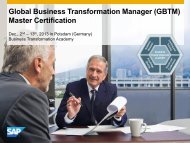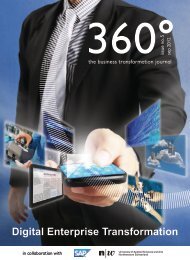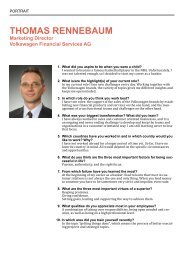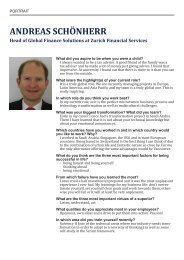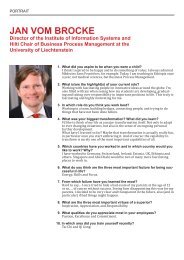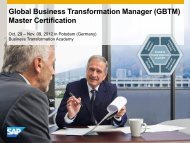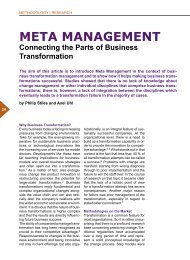360 02 g Case Study Kresak Corvington Wiegel ... - BTA online
360 02 g Case Study Kresak Corvington Wiegel ... - BTA online
360 02 g Case Study Kresak Corvington Wiegel ... - BTA online
Create successful ePaper yourself
Turn your PDF publications into a flip-book with our unique Google optimized e-Paper software.
54<br />
CASE STUDY
CASE STUDY<br />
VODAFONE ANSWERS<br />
CALL TO<br />
TRANSFORMATION<br />
Vodafone’s ongoing business transformation project “Evolution Vodafone” has given<br />
the global communications company a future-proof business model that saves<br />
money and invests in innovation.<br />
by Michaela <strong>Kresak</strong>, Lilian <strong>Corvington</strong>, Frits <strong>Wiegel</strong>,<br />
Guido Wokurka, Stephanie Teufel and Peter Williamson<br />
55<br />
Achieving large-scale change<br />
within any global company is<br />
extraordinarily challenging.<br />
This is particularly the case for<br />
Vodafone. The journey from<br />
a merger-and-acquisitiongrown<br />
company to a shareholder-<br />
and value-driven consumer<br />
business was one of<br />
the main drivers behind the<br />
transformation project. Another<br />
was to help Vodafone<br />
become one global firm under<br />
a single brand instead of<br />
a multitude of independent<br />
companies.<br />
That is why Vodafone, one of<br />
the world’s largest communications<br />
companies, set out<br />
on an ambitious program in<br />
2006. It is radically transforming<br />
the company’s back office<br />
and support operations by<br />
creating a new Future State<br />
Operating model. Dubbed<br />
“Evolution Vodafone” (EVO),<br />
the Business Transformation<br />
Programme is helping Vodafone<br />
become a more competitive<br />
global player. This<br />
mission-critical program supports<br />
back office, value chain<br />
processes: the setup of a<br />
shared service organization,<br />
a globally centralized supply<br />
chain community, and the Vodafone<br />
Procurement Centre<br />
VPC. The resulting operational<br />
savings are enabling further<br />
investment in innovative<br />
technologies and new business<br />
models. This, in turn, is<br />
Abstract<br />
defending and expanding the<br />
company’s market position.<br />
Finally, these combined efforts<br />
are helping Vodafone<br />
achieve a competitive advantage<br />
through greater buying<br />
power, new business models,<br />
and effective acquisition integration.<br />
The project is due for<br />
completion by 2012.<br />
For an overview of relevant<br />
abbreviations, see the information<br />
box on page 60.<br />
The “Evolution Vodafone” (EVO) Business Transformation Programme,<br />
started in 2006, transforms value chain back office processes.<br />
This, in turn, has enabled Vodafone’s local operating companies<br />
to focus on value creation. EVO is introducing one ‘Future<br />
State Operating Model’ (FSOM) that works across supply chain, human<br />
resources (HR) and finance functions to deliver a globally unified<br />
set of standardized business processes. Fundamental aspects<br />
of this program were the creation of a new Core Business Model,<br />
Vodafone Procurement Center, and Shared Service Organization,<br />
underpinned by a global SAP platform. EVO is due for completion<br />
by 2012.
CASE STUDY<br />
56<br />
Vodafone – Uniting Local<br />
Talent for Global Strength<br />
Since it launched its first cellular<br />
network 25 years ago, Vodafone<br />
Group Plc. has grown<br />
through strategic acquisitions<br />
to become one of the world’s<br />
leading mobile telecommunications<br />
companies. In 2010,<br />
it had 85,000 employees with<br />
total revenues of £44.5 billion.<br />
As of 2010, the combined Vodafone<br />
companies had 341<br />
million customers. The company<br />
has equity interests in<br />
more than 30 countries and<br />
partner networks in over 40<br />
countries.<br />
Most of the Vodafone Group’s<br />
mobile subsidiaries operate<br />
under the single flagship<br />
brand ‘Vodafone’. Yet<br />
because of the company’s<br />
acquisition strategy, many of<br />
these companies operated as<br />
stand-alone businesses with<br />
their own business processes.<br />
As a result, inconsistencies<br />
emerged that made it difficult<br />
to operate efficiently as<br />
a single company. This lack<br />
Future State Operating Model (FSOM)<br />
of economies of scale was<br />
one of the major drivers behind<br />
the Vodafone EVO Programme.<br />
Radical Evolution for a<br />
Changing Market Place<br />
In the past, Vodafone had<br />
successfully completed a major<br />
global customer growth<br />
phase. Now it sought to realize<br />
the many benefits of its<br />
larger scale by becoming a<br />
truly global company. At the<br />
same time, senior managers<br />
wanted to send a strong signal<br />
to the market that Vodafone<br />
was far greater than the<br />
sum of its individual assets.<br />
They also wanted to maximize<br />
shareholder revenue<br />
and establish a ‘new way of<br />
working’. To achieve these<br />
The ‘Future State Operating Model’ (FSOM) is designed to:<br />
ᐅᐅ<br />
Get a “single version of the truth” – a single, global, centralized<br />
database that stores all of Vodafone’s business data consistently<br />
and non-redundantly.<br />
ᐅᐅ<br />
ᐅᐅ<br />
ᐅᐅ<br />
ᐅᐅ<br />
ᐅᐅ<br />
ᐅᐅ<br />
ᐅᐅ<br />
Simplify business operations, thus freeing up time and talents to<br />
focus on increasing shareholder value.<br />
Standardize global processes that impact the value chain.<br />
Leverage economies of scale to gain a competitive advantage.<br />
Identify the best commercial solutions to utilize buying power.<br />
Maximize technology to support the new global business model.<br />
Provide a consistent employee experience in a streamlined<br />
organization.<br />
Develop sustainable capability for change and future global<br />
strategies.<br />
Fig. 1: Future State Operating Model<br />
“When we change,<br />
we change together.”<br />
Mission Statement for EVO<br />
goals, they defined a set of<br />
strategies:<br />
––<br />
Drive operational performance.<br />
––<br />
Pursue growth opportunities<br />
in total communications.<br />
––<br />
Execute in emerging markets.<br />
––<br />
Strengthen financial discipline.<br />
Transforming Vodafone’s back<br />
office operations became fundamental<br />
to achieving these<br />
objectives. This move will<br />
improve and streamline business<br />
decision-making processes<br />
with high-quality information,<br />
reduce costs, deliver<br />
greater value creation opportunities,<br />
and offer enhanced<br />
service delivery capabilities.<br />
An example of this is Vodafone’s<br />
strategic goal of building<br />
in-house expertise. At the<br />
start of the EVO Programme,<br />
Vodafone did not have the<br />
business transformation management<br />
experience on the<br />
scale of the EVO implementation.<br />
Management saw the<br />
deployment as an opportunity<br />
to acquire know-how for<br />
future scope extensions and<br />
the implementation of similar<br />
programs. These might include<br />
customer-facing areas<br />
like retail store logistics, back<br />
office extensions in real estate<br />
management, or mobile
CASE STUDY<br />
Inputs<br />
Supply Chain Management (SCM)<br />
Financial Management Human Resources Management (HR) Outputs<br />
Order to Cash (OTC)<br />
Resourcing<br />
Capital<br />
SCM Strategy & Change (S&C)<br />
Budgeting & Planning (B&P)<br />
Learning & Development<br />
Products<br />
Employees<br />
SCM Planning (PLN)<br />
Lust to Dust (LTD)<br />
Reward & Recognition<br />
Services<br />
SCM Sourcing (SOU)<br />
Intercompany<br />
Organisation & Change<br />
Information<br />
Requirement<br />
Procure to Pay (PTP)<br />
Working Practices &<br />
Administration<br />
Information<br />
Satisfaction<br />
Materials<br />
Vendor Performance<br />
Management (VPM)<br />
Manage Travel & Expenses<br />
(T&E)<br />
Treasury and Cash Management<br />
(TCM)<br />
Record to Report (RTR)<br />
Return on<br />
Capital<br />
Warehouse Stock Management &<br />
Fulfillment (WSMF)<br />
Roaming<br />
VPC Trading<br />
Fig. 2: The EVO Core Business Model (CBM)<br />
57<br />
platform innovations.Yet the<br />
EVO Programme will also allow<br />
the Vodafone Group to<br />
act as a truly global company.<br />
From the outset, the decision<br />
was made to exclude customer-facing,<br />
front-end processes<br />
during the first steps of the<br />
rollout. Given the size and<br />
complexity of existing billing<br />
and Customer Relationship<br />
Management (CRM) systems,<br />
for example, management<br />
teams wanted to limit risks<br />
to non-customer-facing, core<br />
value chain processes. Another<br />
consideration was to<br />
build a foundation for future<br />
change.<br />
The EVO Business Transformation<br />
Programme<br />
The EVO Programme is a<br />
large-scale organization. Like<br />
a medium-sized, aggressivegrowth<br />
company, it had the<br />
necessary scale and staff<br />
size to pursue fast-paced<br />
timescales and achieve immediate<br />
results. Housed in a<br />
completely separate building,<br />
team members worked in a<br />
company-within-a-company<br />
atmosphere. This allowed the<br />
programme to move forward<br />
as quickly as possible with<br />
separate, fast-track decisionmaking.<br />
EVO was supported by SAP<br />
in a Value Partnership (VPS)<br />
between SAP and Vodafone.<br />
Accenture and IBM were selected<br />
as implementation<br />
partners. Niall O’Sullivan and<br />
Lilian <strong>Corvington</strong> led the EVO<br />
central team at Vodafone<br />
headquarters in Newbury,<br />
UK. Michaela <strong>Kresak</strong> led a<br />
joint roadmap from the SAP<br />
side to help Vodafone meet<br />
business objectives. After a<br />
tragic accident in Switzerland<br />
in 2011, Neill Crump assumed<br />
her role.<br />
Created as an integral part of<br />
EVO, the Core Business Model<br />
(CBM, see figure 2) translates<br />
Vodafone’s Future State<br />
Operating Model (FSOM, see<br />
fig. 1) into a set of standardized<br />
global business processes,<br />
underpinned by a singleinstance<br />
SAP system. As the<br />
CBM (fig. 2) demonstrates,<br />
Vodafone will introduce 19<br />
new end-to-end business<br />
processes for supply chain<br />
management (SCM), human<br />
resources (HR), and finance<br />
functions. In addition, EVO included<br />
the selection of an Enterprise<br />
Resource Planning<br />
(ERP) platform and an implementation<br />
partner.<br />
Vodafone also implemented<br />
centralized key business<br />
functions to ensure that it gets<br />
the right people with the right<br />
skills doing the right business<br />
activities. To enable SCM<br />
benefits, the company created<br />
one global community reporting<br />
to a single lead. This<br />
allowed the Vodafone Pro-
CASE STUDY<br />
58<br />
curement Company (VPC) to<br />
enable large-scale global procurement<br />
from a single location<br />
and to eliminate activity<br />
duplication.<br />
Finally, the EVO Programme<br />
introduced Shared Service<br />
Centers, an organization that<br />
enables the centralized and<br />
standardized processing of<br />
high-volume business transactions<br />
and other administrative<br />
tasks across SCM,<br />
HR and finance. It leverages<br />
near-shore and off-shore locations<br />
to further optimize operation<br />
costs.<br />
Vodafone’s Approach in<br />
Relation to BTM 2<br />
Vodafone planned and designed<br />
the principles of the<br />
EVO Business Transformation<br />
Programme in April 2006<br />
at “Accelerated Solution Design”<br />
(ASD) events, a series<br />
of seven workshops held at<br />
Pinewood Studios near London.<br />
The workshop participants<br />
met in a special, closedroom<br />
setting that encouraged<br />
open thinking and that was<br />
conductive to the “we are<br />
one” consensus objective.<br />
One outcome – a drawing<br />
Divided into three phases, the EVO Programme has achieved<br />
several critical milestones over the past four years:<br />
2006<br />
2007<br />
2008<br />
2009<br />
2010<br />
2011<br />
2012<br />
Phase 1 (2006 – 2007):<br />
The first step in Vodafone’s business transformation<br />
begins with the setup of the Transformation project.<br />
The design of the Core Business Model, as well as<br />
creation of the supporting SAP platform, has its start.<br />
Phase 2 (2007 – 2009):<br />
EVO delivers its first tangible results. The Vodafone<br />
Procurement Company and the Vodafone<br />
Operations Center are established, followed by the<br />
first country rollouts in Hungary, Germany, and<br />
India.<br />
Phase 3 (2010 – 2012):<br />
EVO enlarges its footprint to enable Vodafone to<br />
become a global player. International rollouts are<br />
scaled up, with multiple concurrent releases going<br />
live every six months. The Third-party Logistics<br />
Terminals Model (3TM) program is created to focus<br />
on handset logistics and the EVO Fast Track for<br />
emerging countries. The EVO program will be completed<br />
in 2012.<br />
Fig. 3: EVO‘s Three Phases<br />
that shows the transformation<br />
drivers and programme<br />
deliverables of the EVO Programme<br />
– is presented in figure<br />
4.<br />
The Vodafone business<br />
transformation approach that<br />
emerged from these ASD<br />
meetings bears a remarkably<br />
strong correlation to the eight<br />
disciplines of BTM 2 . This correlation<br />
is one of the reasons<br />
Vodafone participated in this<br />
case study. For an overview<br />
of the BTM 2 approach, see<br />
page 25 in issue 1 of the <strong>360</strong>°<br />
Journal. Readers will find a<br />
detailed description of EVO<br />
alongside the 8 disciplines of<br />
the BTM 2 below.<br />
Strategy Management<br />
Applied in EVO<br />
The strategic management<br />
discipline is designed to help<br />
managers plan transformation<br />
projects in a way that<br />
benefits the business. Vodafone’s<br />
primary interest in<br />
transformation was to make<br />
the move from a merger-andacquisition-grown<br />
technology<br />
company to a shareholderdriven,<br />
consumer company. It<br />
also sought to join its multiple<br />
subsidiaries into one global<br />
company. The effort has<br />
made Vodafone a more competitive,<br />
global player. The<br />
resulting operational savings<br />
can be invested in other innovative<br />
technologies. The newfound<br />
flexibility also supports<br />
new business models that<br />
strengthen its market position<br />
with greater buying power,<br />
lower transaction costs, and<br />
economies of scale. These
CASE STUDY<br />
benefits should then help<br />
pave the way for new acquisitions<br />
in emerging markets.<br />
In the meantime, the EVO<br />
Programme has already<br />
tapped into several potential<br />
value areas. With the end of<br />
the rollouts, a new EVO phase<br />
will begin. It will focus on hidden<br />
value potentials and operating<br />
model ‘fine-tuning’.<br />
Value Management in EVO<br />
Value management organizes<br />
and manages business transformation<br />
projects like EVO<br />
to realize maximum potential<br />
value. This discipline offers<br />
tools and techniques to help<br />
organizations better identify<br />
business value, build the<br />
business case, and manage<br />
necessary changes.<br />
By consistently applying<br />
these concepts, techniques,<br />
and frameworks, the EVO<br />
Programme is achieving annual<br />
cash savings of over<br />
€550 million. Vodafone has,<br />
for example, realized savings<br />
through Shared Service Center<br />
standardized transaction<br />
processing and lower total<br />
cost of ownership from IT. By<br />
the end of 2011, over 60,000<br />
employees will be using EVO<br />
processes, systems, and new<br />
ways of working.<br />
Risk Management in EVO<br />
The risk management discipline<br />
within BTM 2 gives organizations<br />
a comprehensive<br />
and enterprise-wide view of<br />
strategic risks. These risks are<br />
defined as external risk drivers<br />
that could impact – either<br />
negatively or positively – the<br />
Fig. 4: A Schematic Illustration of Project EVO<br />
company’s ability to achieve<br />
its strategic objectives on a<br />
two- to five-year horizon. Vodafone<br />
continues to use this<br />
discipline to identify risks at<br />
both the local and global level.<br />
By avoiding potential pitfalls<br />
with a predefined risk clarification<br />
framework, EVO is able to<br />
document the probability and<br />
impact of potential threats. It<br />
can then take mitigating actions.<br />
Instead of exploring<br />
risks during the different project<br />
phases, the EVO team<br />
initiates risk workshops at the<br />
very beginning of every rollout.<br />
Based on project scope and<br />
lessons learned from previous<br />
rollouts, as many risks are<br />
identified as possible. Mitigating<br />
actions are then assigned<br />
to each of them. The most<br />
common EVO risks involve<br />
legacy IT system integration.<br />
Another area deals with competition<br />
due to critical parallel<br />
projects. Other risks include<br />
top resource availability, external<br />
partnership dependencies,<br />
executive sponsorship, and<br />
key stakeholder buy-in over<br />
a five-year program. Among<br />
the most efficient risk mitigation<br />
actions were commercial<br />
and legal safeguarding. This<br />
included changing the original<br />
Accenture contract into a<br />
multi-vendor contract. They<br />
proved to be especially valuable<br />
in times of crisis for the<br />
program. Thanks to risk management,<br />
Vodafone has been<br />
able to realize business case<br />
benefits better and to move to<br />
an operational business-asusual<br />
model while managing<br />
rollouts.<br />
59
CASE STUDY<br />
60<br />
Process Management<br />
in EVO<br />
CBM process standardization<br />
and simplification are the key<br />
EVO Programme drivers. As<br />
a fundamental part of CBM,<br />
they make shared services<br />
possible. As a result, they<br />
lower transaction costs. Prior<br />
to EVO, process management<br />
at Vodafone was done<br />
on a market-by-market basis<br />
with different process modeling<br />
methods and tools. EVO<br />
developed one global process<br />
standard in the Architecture<br />
of Integrated Information Systems<br />
(ARIS) toolset. Based<br />
on this standard, new processes<br />
are created for supply<br />
chain management, human<br />
resources, and finance. They<br />
provide a consistent employee<br />
experience and simplify<br />
the way the CBM is operated.<br />
More recently, Vodafone has<br />
also made a strategic move<br />
toward working with a multivendor<br />
EVO approach in the<br />
future. CBM technical documentation<br />
is now stored in<br />
the SAP Solution Manager, a<br />
centralized support and system<br />
management suite. SAP<br />
Solution Manager provides<br />
an extensive set of features<br />
in the IT Support area for enhancing,<br />
automating, and improving<br />
the management of<br />
SAP systems. ARIS and SAP<br />
Solution Manager are now<br />
fully integrated and published<br />
on the Vodafone intranet. In<br />
doing so, the team has created<br />
a leading-edge portal<br />
for the CBM. This investment<br />
now provides a consolidated<br />
platform for Vodafone. It enables<br />
continuous improvement,<br />
effectiveness, and an<br />
efficient business-as-usual<br />
mode across the model’s entire<br />
lifecycle.<br />
EVO Abbreviations<br />
3TM<br />
ASD<br />
CBM<br />
EVO<br />
FSOM<br />
OpCo<br />
VPC<br />
Third-party Logistics Terminals Model<br />
Accelerated Solution Design<br />
Core Business Model<br />
Evolution Vodafone<br />
Future State Operating Model<br />
Operating Company<br />
Vodafone Procurement Company<br />
Program and Project Management<br />
in EVO<br />
Program and project management<br />
is a comprehensive<br />
discipline. It makes it possible<br />
to manage various program<br />
elements centrally to achieve<br />
specific business objectives.<br />
It also supports project leaders<br />
in making informed decisions<br />
on a number of related<br />
elements to achieve specific<br />
outcomes. Vodafone used<br />
this valuable discipline to define<br />
its rollout strategy, track<br />
the business case, achieve<br />
good governance, handle<br />
scope, manage risks, and<br />
plan resources. To ensure<br />
this, Vodafone used a standard<br />
program management<br />
method. As a result, project<br />
leaders continue to provide<br />
governance and a common<br />
set of tools and processes to<br />
support EVO implementation<br />
teams’ IT projects. EVO Programme<br />
management has<br />
also paid specific attention to<br />
a key challenge that any complex<br />
program faces: ensuring<br />
information flow visibility<br />
among the program’s various<br />
groups. The team is also responsible<br />
for making certain<br />
that explicit approval mechanisms<br />
are in place at each<br />
program stage. The program<br />
also produced another very<br />
tangible result: Vodafone won<br />
the SAP EMEA Quality Award<br />
as a GOLD Winner.<br />
Every large-scale program<br />
faces a tipping point where<br />
the business support organization<br />
outgrows the program<br />
organization. The business<br />
owners’ agenda is driven by<br />
operational objectives that<br />
are not equal to roll-out completion.<br />
At the time of this writing,<br />
the issue has been identified.<br />
The resolution, however,<br />
is still in progress.<br />
IT Transformation Management<br />
in EVO<br />
IT transformation management<br />
helps change an organization’s<br />
technology systems<br />
to reduce costs, achieve lower<br />
total cost of ownership, and<br />
enhance quality and performance.<br />
In terms of this discipline,<br />
Vodafone hired a group<br />
of people in the Vodafone
CASE STUDY<br />
organization with extensive<br />
experience in global transformation<br />
programs and extensive<br />
technical expertise. After<br />
a detailed selection process,<br />
SAP was chosen as the ERP<br />
value partner for its standard,<br />
out-of-the-box, best-practice<br />
processes. Additional business<br />
software products were<br />
chosen from Informatica,<br />
Opentext, Readsoft, Sabrix,<br />
Redwood, HP, and Remedy<br />
for their ability to integrate<br />
within an SAP-based IT landscape.<br />
One of the key challenges for<br />
Vodafone was the consolidation<br />
of all local legacy ERP<br />
packages. Project managers<br />
were confronted with large<br />
numbers of interfaces, users,<br />
and legal requirements. To<br />
add to the task’s complexity,<br />
the IT organization had to shift<br />
from a mostly independent,<br />
local IT department working<br />
structure into a more collaborative<br />
global model. Finally,<br />
the EVO Programme had to<br />
accommodate sheer scale.<br />
For instance, by 2012, more<br />
than 80,000 people will be using<br />
EVO in multiple locations<br />
around the world. Each year,<br />
Vodafone processes more<br />
than 50 million SAP IDOC (Intermediate<br />
Document) “messages”,<br />
a standard SAP document<br />
format used for data in<br />
purchase orders, for example,<br />
or the supplier profile information<br />
in a supplier master<br />
record. 1,000 interfaces will<br />
connect legacy systems. Two<br />
data centers in Germany and<br />
India will also host more than<br />
280 dedicated servers.<br />
Change and Training<br />
Management in EVO<br />
Change management defines<br />
and addresses the things that<br />
cause change. Large companies<br />
like Vodafone use it to<br />
make radical, complex, and<br />
necessary change for future<br />
success. It also defines why<br />
change is necessary in the<br />
first place. In doing so, it enables<br />
people, teams, and organizations<br />
to adopt change.<br />
It also supports managers in<br />
successfully leading change<br />
processes. Recognizing that<br />
enduring, meaningful change<br />
requires organizational buy-in<br />
at all levels, Vodafone used<br />
the change management discipline<br />
to lead by example.<br />
Yet change management and<br />
training have proven to be<br />
quite a challenge for the EVO<br />
Business Transformation Programme.<br />
This was because<br />
Vodafone operating companies<br />
(OpCos) began the EVO<br />
Programme from very heterogeneous<br />
starting points. As a<br />
result, it was difficult to design<br />
and build a “one-size-fits-all”<br />
training library that addressed<br />
the adoption needs of all endusers.<br />
In terms of systems, the Op-<br />
Cos began EVO with very different<br />
legacy IT landscapes<br />
and user experiences. For<br />
OpCos who were already<br />
using SAP, for example, the<br />
new user experience was an<br />
extension of the existing one.<br />
For OpCos transitioning from<br />
“This culture of acknowledging and<br />
learning from our mistakes is critically<br />
important and must be constantly<br />
nurtured and developed.”<br />
Niall O’Sullivan, EVO’s Global Programme Director<br />
Oracle, however, the profound<br />
technical and end-user<br />
changes represented a complete<br />
break with the past.<br />
From a process perspective,<br />
EVO forced all employees to<br />
work and think differently than<br />
they had before. A prime example<br />
was the introduction<br />
of a new three-way matching<br />
system (purchase order,<br />
receipt, and invoice) within a<br />
purchase-to-pay process to<br />
approve invoices automatically<br />
for payment.<br />
There are several major challenges<br />
in driving a global<br />
change programme, among<br />
them the “not invented here”<br />
syndrome, cultural differences,<br />
and lack of ramp-up time.<br />
To overcome these, Lilian<br />
<strong>Corvington</strong> was convinced<br />
that an accelerated, intensive<br />
preparation programme was<br />
necessary before any rollout<br />
61
CASE STUDY<br />
62<br />
started in local markets. She<br />
introduced the ‘Fit for EVO’<br />
approach, which proved very<br />
successful. The sessions<br />
brought together local teams,<br />
local senior management,<br />
global teams, system integrators,<br />
and local IT vendors in a<br />
conducive, one-team environment.<br />
This not only facilitated<br />
knowledge transfer, but it also<br />
created positive momentum<br />
and convinced “changeagents”.<br />
Additionally, ‘EVO ambassadors’<br />
have been appointed.<br />
These are key project members<br />
who have already gained<br />
deep EVO knowledge in one<br />
country. They are then reappointed<br />
to support another<br />
country with their business<br />
transformation know-how. As<br />
a result, lessons learned are<br />
employed at every new release.<br />
To cater to all training needs,<br />
a “Core Training Library” was<br />
set up. It consists of over<br />
1,000 training assets and<br />
covers all business processes<br />
and functionalities provided<br />
by EVO. To accommodate<br />
local EVO language requirements,<br />
materials are provided<br />
in English, German, Spanish,<br />
and Italian. Finally, each of<br />
these efforts has been managed<br />
to be as cost effective<br />
as possible.<br />
A Tale of an<br />
Implementation Journey<br />
Hungary and Germany were<br />
the two countries selected<br />
for the pilot. Because of the<br />
delays described earlier in<br />
this study, the go-live dates<br />
for both countries were staggered.<br />
Hungary was the first<br />
to deploy because of its size.<br />
Germany went second.<br />
The experiences provided<br />
“A global business transformation<br />
like the EVO Programme requires<br />
stable, well-proven technology.”<br />
Andy Halford, Global CFO, Vodafone<br />
by the initial setup of the procurement<br />
center and the first<br />
shared service center in Hungary<br />
proved to be extremely<br />
valuable. The subsequent<br />
rollouts in Hungary and Germany<br />
also provided a study<br />
in contrasts for the kinds of<br />
challenges faced by the EVO<br />
Team. Due to their different<br />
IT landscapes, corporate cultures,<br />
requirements, and expectations,<br />
the countries approached<br />
pre-, during-, and<br />
post-launch experiences in<br />
very different ways. This required<br />
the EVO Programme<br />
to develop adaptive response<br />
mechanisms that anticipate<br />
future rollout challenges and<br />
that avoid one-size-fits-all<br />
strategies.<br />
The implementation started<br />
with the creation of the Vodafone<br />
Procurement Company<br />
(VPC) and the Vodafone Operations<br />
Centre in Hungary<br />
(VOCH) shared service center<br />
based in Hungary. Within<br />
a matter of weeks, complex<br />
structures were created in<br />
record time to help OpCos<br />
operate globally. Hundreds<br />
of top-skilled internal and external<br />
Vodafone professionals<br />
began working together in<br />
new facilities using the CBM<br />
processes for the first time.<br />
In spite of the significant investments<br />
in both time and<br />
money, the first rollout was<br />
ultimately delayed. Teams<br />
engaged in lengthy strategic<br />
design discussions. Yet their<br />
plans failed to reach the execution<br />
stage. Senior management<br />
ultimately decided<br />
to force the issue by setting<br />
down a hard deadline for<br />
deployment. This prompted<br />
EVO teams to change the<br />
style and substance of their<br />
deliberations and planning.<br />
Discussions became more focused<br />
and solution oriented.<br />
The ground rules had clearly<br />
changed.<br />
Rollout Hungary<br />
Headquartered in Budapest,<br />
Vodafone Hungary is a midsize<br />
company that employs<br />
2,000 people. Before EVO, it<br />
had a legacy Oracle environment<br />
with basic functionality.<br />
This made the EVO launch in<br />
Hungary less complex than
CASE STUDY<br />
at many of its larger counterparts<br />
in Western Europe. It<br />
also made it an ideal counterweight<br />
to its more mature<br />
trial partner, Germany. Due<br />
to the above – and the fact<br />
that Hungary had a relatively<br />
small IT platform and a strong<br />
need to strengthen process<br />
and controls – it offered little<br />
resistance in changing its IT<br />
systems and business processes.<br />
During the actual go-live, senior<br />
management had high<br />
expectations for the EVO<br />
team and employees. Not<br />
only would the program ultimately<br />
force the organization<br />
to adapt to new business processes<br />
and to a new shared<br />
services organization, it would<br />
also change the very way colleagues<br />
worked together.<br />
Although the Hungary EVO<br />
team was well prepared<br />
for the actual launch, it did<br />
not foresee the amount of<br />
hands-on support that endusers<br />
would require. During<br />
the early days, weeks, and<br />
months following deployment,<br />
the high volume of support<br />
requests greatly exceeded<br />
initial estimates. This had a<br />
significant impact on resource<br />
availability for both Vodafone<br />
core teams and Accenture<br />
teams. As a result, personnel,<br />
assets, and materials<br />
that could have been devoted<br />
to the next EVO release were<br />
held back. This experience<br />
and key learning went on to<br />
have a profound impact on<br />
the large-scale deployment<br />
scheduled that launched in<br />
Germany just weeks later.<br />
Rollout Germany<br />
In contrast to Vodafone Hungary,<br />
Vodafone Germany<br />
is a very mature company.<br />
From 2009 to 2010, it earned<br />
€9.04 billion p.a., which represents<br />
more than 20 percent<br />
of Vodafone’s total revenue.<br />
Headquartered in Dusseldorf,<br />
Germany, it has 13,000 employees.<br />
Germany was also an attractive<br />
choice for the pilot. It was<br />
Europe’s largest market, and<br />
it had a mature SAP platform.<br />
Project managers reasoned<br />
that if they could achieve a<br />
successful go-live in Germany,<br />
they would be able to<br />
bring the remaining entities<br />
on board. Teams within the<br />
German organization were<br />
also motivated to participate.<br />
As experienced SAP users,<br />
they wanted to influence the<br />
implementation’s final design.<br />
The EVO deployment posed a<br />
greater challenge to Vodafone<br />
Germany. The organization<br />
had over 130 legacy systems<br />
and had been an experienced<br />
SAP user for over a decade.<br />
Over time, it had adapted<br />
its systems to local requirements<br />
and working styles.<br />
This included many customized<br />
business processes. The<br />
pending deployment meant<br />
that much of this dearly-held<br />
functionality would be standardized<br />
and eliminated. As<br />
a result, there was significant<br />
skepticism among many internal<br />
stakeholders.<br />
The deployment also took on<br />
a socio-political dimension<br />
– a factor that was absent<br />
from the rollouts in Hungary<br />
and later in emerging market<br />
countries. The work split with<br />
the newly established procurement<br />
and shared service<br />
centers conflicted with employees’<br />
strongly held values<br />
of social fairness and job security.<br />
The deployment was<br />
perceived by some employees<br />
as a potential “job killer”.<br />
As a result, the rollout was<br />
sometimes met with significant<br />
resistance.<br />
To minimize risk and give Vodafone<br />
Germany ample time<br />
to adjust to change, a phased,<br />
incremental approach was<br />
chosen over a “big bang”.<br />
Thanks to the early experiences<br />
in Hungary, the EVO<br />
team also moved quickly to<br />
provide hypercare – one-onone,<br />
on-location support – to<br />
all employees affected by the<br />
transition.<br />
Support teams dressed in<br />
red T-shirts were dispatched<br />
throughout the Vodafone<br />
Germany campus to answer<br />
questions, solve problems,<br />
and liaise with project leaders.<br />
This direct support effort<br />
provided the EVO team with<br />
a critical set of quick-wins<br />
to overcome resistance and<br />
drive adoption. Support was<br />
complemented by comprehensive<br />
education sessions<br />
and training events. Senior<br />
corporate executives also<br />
personally assisted in adoption<br />
efforts. OpCo Board-level<br />
managers participated in a<br />
large-scale communications<br />
drive, making themselves visible<br />
to employees throughout<br />
the deployment and expressing<br />
their explicit support for<br />
63
CASE STUDY<br />
64<br />
EVO. Finally, the EVO team<br />
offered important compromises.<br />
Some solutions were<br />
adapted to better meet local<br />
requirements, most notably<br />
the decision not to implement<br />
the order-to-cash process. At<br />
the same time, not all workers<br />
were moved to the shared<br />
services center during the<br />
first phase. This helped to<br />
minimize the degree of sudden<br />
change in such a large<br />
organization.<br />
Vodafone and Accenture<br />
also faced major challenges<br />
and risks to their commercial<br />
obligations. Because of the<br />
program’s enormous size,<br />
scope, and complexity, commercial<br />
issues emerged with<br />
Accenture and an escalation<br />
ensued. This forced the<br />
global leadership teams from<br />
both parties to agree to new<br />
terms and conditions to be<br />
able to continue the EVO Programme.<br />
Unlocking Unexpected<br />
Opportunities<br />
Over the course of the project,<br />
EVO teams also had the<br />
opportunity to apply the lessons<br />
learned in Hungary and<br />
Germany. This added value<br />
to two unexpected opportunities,<br />
leading to a successful<br />
extension of scope of the<br />
EVO Programme. For a related<br />
discussion of the project’s<br />
working culture, see figure 5.<br />
The first opportunity emerged<br />
from the Third-party Logistics<br />
Terminals Model (3TM). As<br />
a mobile operator, Vodafone<br />
provides connectivity to its<br />
cellular and data networks.<br />
Challenges of Business Transformation<br />
Over the course of the first rollouts, EVO teams learned how to<br />
provide immediate, effective solutions to common problems. By<br />
creating a culture that acknowledged and learned from mistakes,<br />
the program achieved several important objectives:<br />
ᐅᐅ<br />
ᐅᐅ<br />
ᐅᐅ<br />
ᐅᐅ<br />
ᐅᐅ<br />
ᐅᐅ<br />
Maintain momentum over multiple years<br />
Cater to changing business models<br />
Manage people and change actively<br />
Get to ‘business-as-usual’ as quickly as possible<br />
Adopt a global platform<br />
Manage the initial negative effects of the implementation on the<br />
local market<br />
Fig. 5: Challenges of Business Transformation<br />
The original scope of the EVO<br />
Programme was designed<br />
to address this aspect of its<br />
business. Yet Vodafone is<br />
also a large-scale retailer. It<br />
sells handsets, devices, and<br />
accessories, and pairs them<br />
with services in its own retail<br />
stores and through other<br />
sales channels. Recognizing<br />
the need to harmonize processes<br />
across the Vodafone<br />
business, the EVO team created<br />
a new common terminals<br />
operating model, 3TM. This<br />
model was quickly handed to<br />
EVO as the delivery vehicle<br />
of choice for implementing<br />
global large-scale transformation<br />
programs. A 3TM pilot<br />
program was successfully<br />
implemented in July 2010 for<br />
Vodafone Netherlands, and<br />
it received overwhelmingly<br />
positive feedback from internal<br />
and external stakeholders.<br />
The second opportunity<br />
emerged during an unexpected<br />
pan-Indian EVO rollout<br />
called “Project Tiger”.<br />
India’s Hutchison Essar was<br />
acquired by Vodafone to become<br />
Vodafone Essar in May<br />
2007. Because India was not<br />
part of the Vodafone family<br />
when the EVO Programme<br />
was launched in 2007, integration<br />
of the new business<br />
was an unexpected additional<br />
task. Through its “Project Tiger”,<br />
Vodafone set out to help<br />
Vodafone Essar consolidate<br />
and standardize processes<br />
in order to sustain planned<br />
growth. The pan-Indian rollout<br />
was completed by July 7,<br />
2010 – with zero disruption to<br />
the business during the entire<br />
implementation phase.<br />
Empowering Transformation<br />
Success<br />
In overcoming all of these<br />
challenges, finance, supply<br />
chain, and HR have successfully<br />
converted their business<br />
operations to the ‘new Vodafone<br />
way of working’.<br />
In SCM, the ‘One Supply<br />
Chain Management’ element<br />
of the EVO Programme has
CASE STUDY<br />
Key Learnings<br />
ᐅᐅ<br />
ᐅᐅ<br />
ᐅᐅ<br />
ᐅᐅ<br />
ᐅᐅ<br />
ᐅᐅ<br />
ᐅᐅ<br />
ᐅᐅ<br />
ᐅᐅ<br />
ᐅᐅ<br />
ᐅᐅ<br />
ᐅᐅ<br />
Keep launch commitments, even if it means temporarily overriding internal resistance.<br />
Involve key individuals and organizations in project design and planning as early as possible.<br />
Simulate new business processes at an early stage to avoid threats to service quality and stakeholder<br />
buy-in.<br />
Delays and challenges are inevitable. Be ready for them with strong structure and superior skills.<br />
Turn big challenges as ‘scope creep’ into new opportunities by creating spin-off projects.<br />
Be able to quantify, track, and continually communicate your program’s financial and strategic benefits.<br />
Get the best people on your team as soon as possible. At the same time, understand that high performers<br />
in existing roles may not be suited to high-stress project management roles.<br />
Do proactively address performance issues in the program and drive the solution of these issues.<br />
The urgent nature of transformation projects leave little time for potential difficulties.<br />
Put strong commercial and legal arrangements in place quickly.<br />
Continually evaluate the performance of all suppliers.<br />
Create an environment where people can be very open about their issues and mistakes. This also<br />
applies to communications with senior management<br />
Stay on budget! Make sure that financial support is big enough before you start. Avoid appropriating<br />
additional resources after the fact.<br />
65<br />
succeeded in streamlining<br />
operations. Now they are<br />
more consistent, and they<br />
foster collaboration as a community.<br />
The project has also<br />
introduced a newly appointed<br />
global head of supply chain,<br />
a consistent way of getting<br />
things done, and a unified<br />
organizational structure. Vodafone<br />
now qualifies its suppliers.<br />
This allows the company<br />
to take advantage of<br />
volume purchasing through<br />
eProcurement tools. Instead<br />
of managing 19 separate local<br />
markets, Vodafone now<br />
deals with one location and<br />
with one contract.<br />
In HR, teams are focused on<br />
delivering great employee<br />
experiences. This is helping<br />
the company achieve its strategic<br />
objectives through its<br />
people. EVO does this in several<br />
ways. Line managers,<br />
for example, are empowered<br />
to strengthen relationships<br />
with their employees. They<br />
achieve this by promoting operational<br />
excellence through<br />
self-service learning, events,<br />
and personal data management.<br />
Today, finance is also evolving<br />
to become a high-performing<br />
global team. EVO enables<br />
this transformation with<br />
a single finance platform and<br />
shared service centers that<br />
use consistent business principles<br />
and processes. In the<br />
future, Vodafone also hopes<br />
that these services will shift<br />
administrative and volume<br />
transaction processing responsibilities<br />
from the OpCos<br />
to let them focus on value<br />
creation aligned to strategic<br />
objectives.<br />
The authors would like to thank:<br />
ᐅᐅ<br />
Andy Halford (Chief Financial Officer for Vodafone),<br />
ᐅᐅ<br />
Niall O’Sullivan (Programme Director for the EVO Program at<br />
Vodafone)<br />
ᐅᐅ<br />
Giovanni Chiarelli (Programme Delivery Director)<br />
ᐅᐅ<br />
Marcus Cotes (Global Head of Enterprise Resource Planning at<br />
Vodafone)<br />
for sharing their experiences and lessons learned in the transformation<br />
program.
CASE STUDY<br />
AUTHORS<br />
Michaela <strong>Kresak</strong> was SAP’s Global Programme Director for Vodafone, with more<br />
than 15 years experience in the telecommunications industry, working for operators,<br />
start-up companies and large consultancies around the world. Michaela held<br />
a Masters degree from the University of Vienna and the University College Dublin,<br />
and an Executive MBA from the University of Fribourg and the Cambridge Judge<br />
Business School. Michaela was the driving force behind instigating this study<br />
and worked tirelessly to build the relationship between Vodafone, SAP and the<br />
academic world. Michaela tragically passed away prior to the publication of this<br />
study, Vodafone and SAP dedicate this paper to the memory of someone who was<br />
truly inspirational.<br />
66<br />
Lilian <strong>Corvington</strong> is the Global Implementation Lead for EVO and 3TM and has<br />
directed several similar large-scale programs world-wide. Previously, she was Director<br />
of Global Transformation and Process Management at Alcatel-Lucent. She<br />
has been an independent Management Consultant and a partner at Deloitte &<br />
Touche earlier in her career, with a focus in the Telecom and Retail industries. Lilian<br />
has two Masters Degrees: MBA/MIS and Manufacturing Production Planning.<br />
lilian.corvington[at]vodafone.com<br />
Frits <strong>Wiegel</strong> is the Global Head of Process Governance in EVO. He joined Vodafone<br />
since 2007. His responsibilities include the development and implementation<br />
of Vodafone’s Business Process Management strategy, maintain global process<br />
integrity and support EVO transformation implementation. Prior to joining Vodafone<br />
he held the position of Corporate Process architect in Alcatel. Frits hold a<br />
Master degree in Business Administration from Bradford University.<br />
frits.wiegel[at]vodafone.com<br />
Dr. Guido Wokurka is Director at SAP and heading Business Transformation<br />
Services for Western Europe. Over the last more than 10 years he has worked<br />
with most of Europe’s top 10 telecommunications service providers. Prior to joining<br />
SAP he was senior manager at Alcatel (now Alcatel-Lucent). Guido holds an<br />
executive MBA degree from the iimt and completed the Advanced Leadership<br />
Program at the University of Cambridge last year.<br />
guido.wokurka[at]sap.com<br />
Prof. Dr. Stephanie Teufel is the Director of the iimt (international institute of<br />
management in technology) at University of Fribourg, Switzerland and holds a full<br />
professorship in ICT Management at the faculty of Economics and Social Sciences.<br />
Dr. Teufel has published numerous international publications in the fields<br />
of information security management, innovation and technology management as<br />
well as mobile business.<br />
stephanie.teufel[at]unifr.ch<br />
Prof. Peter Williamson is Professor of International Management and Fellow<br />
Commoner of Jesus College at the University of Cambridge. He holds a PhD from<br />
the Harvard University. He is also Non-Executive Chairman of the Board of Directors<br />
of the macro hedge fund manager Tactical Global Management.<br />
p.williamson[at]jbs.cam.ac.uk
CASE STUDY COMMENT<br />
Think Global, Adapt Local<br />
A Comment on the Vodafone <strong>Case</strong> by Werner Schultheis<br />
The EVO case study provides<br />
an overview of how<br />
global companies are challenged<br />
to drive large-scale<br />
transformation programs for<br />
new business models and<br />
further growth. The EVO vision<br />
and strategic roadmap<br />
to increase shareholder<br />
value follow well-known patterns<br />
that we have seen in<br />
many other international<br />
companies before. This case<br />
study nonetheless shows<br />
why multinational transformations<br />
could not be executed<br />
within a simple copy-andpaste<br />
approach.<br />
The EVO case also underscores<br />
how different languages,<br />
cultures, and corporate<br />
DNAs, like management,<br />
processes and systems, can<br />
be significant drivers in any<br />
whole-scale transformation<br />
process. This is particularly<br />
true for Vodafone – a company<br />
forged by a series of<br />
international mergers and<br />
acquisitions. Acting independently,<br />
each of these regional<br />
companies had established<br />
its own powerful financial,<br />
human resources, and procurement<br />
departments. This<br />
fueled resistance to change<br />
during country-by-country<br />
rollout phases. That is why<br />
the EVO project team’s decision<br />
to conduct small-scale<br />
rollouts was the right way to<br />
go, particularly in Hungary<br />
– home of Vodafone’s new<br />
HR and financial back office.<br />
Hungary provided a critical<br />
first lesson in business transformation<br />
management. And<br />
it would prove to be an important<br />
lesson learned for<br />
subsequent roll-outs in bigger<br />
and more powerful Vodafone<br />
countries.<br />
During the rollout in Germany,<br />
the EVO team also made<br />
several crucial key learnings:<br />
––<br />
Manage expectations up<br />
front.<br />
––<br />
Involve top management<br />
early, often, and extensively.<br />
––<br />
Give people time to learn<br />
and adopt new ways of<br />
working within a different<br />
process and system<br />
environment.<br />
Only when these prerequisites<br />
are fulfilled can true<br />
change happen.<br />
AUTHOR<br />
That is why the EVO case<br />
study is an example of the<br />
challenges that companies<br />
face during global business<br />
transformation processes. At<br />
the same time, it also demonstrates<br />
how other organizations<br />
can benefit from experiences<br />
like this 3TM project<br />
to drive future change.<br />
The EVO project followed a<br />
well-known, logical business<br />
model pattern. Yet a business<br />
transformation blueprint for<br />
a smooth international transition<br />
– one that fits all industries,<br />
countries, and cultures<br />
– remains elusive. That is<br />
why Vodafone’s decision to<br />
invest in building up its own<br />
institutional knowledge for<br />
transformation competence<br />
was a wise one. As a result,<br />
the global company has succeeded<br />
in creating a framework<br />
that designs future<br />
business models globally –<br />
and adapts them locally.<br />
Werner Schultheis is Director IT & Processes<br />
at Randstad Deutschland GmbH & Co. KG.<br />
Before he changed to IT & Processes, he was<br />
Director Business Development and District<br />
Manager in the sales organisation. He holds<br />
an engineering degree of the TU Darmstadt,<br />
Germany.<br />
werner.schultheis[at]de.randstad.com<br />
67



